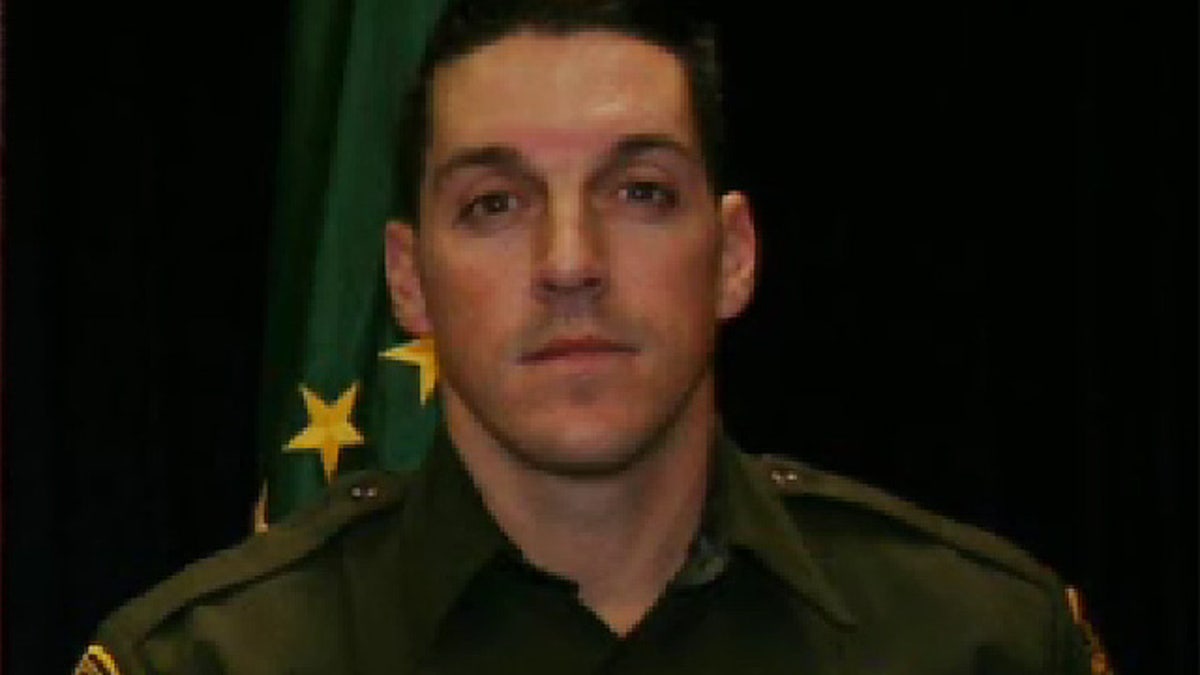
Agent Brian A. Terry, 40, was killed on Dec. 14 near Rio Rico, Ariz., according to a statement released by U.S. Customs and Border Protection officials. (FNC)
The U.S. Border Patrol is under fire for allegedly ordering its elite, SWAT-style units to use non-lethal bean bag ammunition before responding with deadly force – even against suspects armed with high-powered semi-automatic and automatic weapons like AK-47s.
The controversy over the agency’s “bean bag” policy began in the days following the Dec. 14 killing of U.S. Border Patrol agent Brian Terry and has escalated recently as more information is uncovered in the investigation of the fatal shooting.
"When the suspected aliens did not drop their weapons, two Border Patrol agents deployed ‘less than lethal' beanbags at the suspected aliens,” according to a FBI search warrant request filed in the U.S. District Court in Tucson on Dec. 29. “At this time, at least one of the suspected aliens fired at the Border Patbrol agents. Two Border Patrol agents returned fire, one with his long gun and one with his pistol. Border Patrol agent Brian Terry was shot with one bullet and died shortly after.”
The warrant appears to support claims made by Terry’s brother, Kent, and former U.S. Rep. Tom Tancredo that Terry’s team -- part of the U.S. Border Patrol Tactical Unit, also known as BORTAC -- was under standing orders to always use bean-bag rounds first before using live ammunition.
"There was a group of four guys with my brother and two had lethal and two had non-lethal weapons there," Kent Terry told Fox News Friday.
Tancredo wrote about the issue in a Dec. 18 op-ed article.
Although it’s not clear how many, if any, border patrol units were ordered to carry the non-lethal beanbag ammunition, one expert insists the order has been applied to at least all BORTAC teams in Arizona – if not the entire Border Patrol.
“That order stemmed from the incident on the El Paso-Juarez border in which an agent discharged a sidearm to defend himself from rock throwers,” said Andy Ramirez, founder of the advocacy group Friends of the Border Patrol. Ramirez was referring to a June shooting that left a 15-year-old Mexican boy dead.
Mexico was outraged at the incident, so Victor Manjarrez Jr., then chief of Border Patrol’s Tuscon sector, “acquiesced by ordering agents to use non-lethal loads,” Ramirez said.
U.S. Customs and Border Protection spokesman, Agent Mark Qualia, said at the very least, "every law enforcement personnel within CBP has a sidearm which is fully loaded, along with two additional magazines,” and denied that units were ordered to use non-lethal bean bag ammunition first.
“There was no order given to any CBP law enforcement personel – now or in the past – that indicates the use of less lethal devices before using deadly force,”Qualia, told FoxNews.com.
But T.J. Bonner, president of the National Border Patrol Council, the border agents’ union, said there are “conflicting statements” as to whether the agents were under such orders. “Because of the ongoing nature of the investigation, the people who know best aren’t talking.”
Ramirez said regardless of whether the men were ordered to use the bean bags, the simple fact that a Border Patrol tactical team was armed with bean bag ammunition at all was “asinine.”
“BORTAC is like a SWAT unit; they’re our most highly trained, specialized unit of agents. These guys go in when we have a serious problem. It would be like sending a SWAT team into a bust with bean bags. ... They were outgunned by far.”
Asked why a BORTAC team would carry guns armed with bean bags, Qualia said, “Why do law enforcement personnel carry Taser guns? If you’re in a confrontational situation where you do not need to use lethal force.”
If the officers did need to use lethal force, Qualia said, they had the freedom to make that decision and the equipment to execute it.
"So I’m not going to Monday morning quarterback a situation where an agent in that heat of the situation has to make that decision...I wasn't there."
Bonner stressed he also "didn’t know all the facts of the case," but said “given the intelligence they had, a number of agents I spoke with question the wisdom of having less than lethal weapons in that situation."
Qualia said the CBP is fully cooperating with the FBI in their continued investigation. “As soon as something's been published, we’ll be able to follow up.”









































